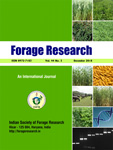RUKOO CHAWLA*, MINAKSHI JATTAN, SANDEEP KUMAR, D. S. PHOGAT, NISHA KUMARI, PRACHI MAHLA, SAVITA MEENA AND BABITA RANI
Ph. D. Research Scholar, Department of Genetics and Plant Breeding,
MPUAT, Udaipur (Rajasthan), India
*(e-mail: rukoochawla21@gmail.com)
(Received : 17 June 2023; Accepted : 29 June 2023)
SUMMARY
A comprehensive evaluation of 62 oat accessions was conducted during Rabi 2019-2020 at Farm Research Area of Forage section, Department of Genetics and Plant Breeding, CCS Haryana
Agricultural University, Hisar (Haryana) to measure and analyze yield-contributing traits. The findings unveiled substantial variability among the oat accessions pertaining to all the scrutinized traits. High heritability along with high genetic advance as percent of mean was observed for all traits except days to 50% flowering and days to maturity. Genotypes namely; OS 403, HFO 1108, GP 781, HFO 1101, HFO 915 and HFO 1104 showed higher seed yield per plant while HFO 1108, HFO 818, HFO 707, HFO 915, HFO 1104 and HFO 529 were found promising for green fodder yield per plant. The discernment of accessions exhibiting coveted trait amalgamations and elevated yield propensity is paramount for oat breeding initiatives. Through the meticulous delineation of variability in these yield attributes, breeders can discerningly concentrate on and assimilate particular traits in their breeding programs. This methodology expedites the progression of refined oat cultivars endowed with augmented yield efficacy and agronomic characteristics.
Key words: Oat, genetic variability, heritability, fodder, seed yield

